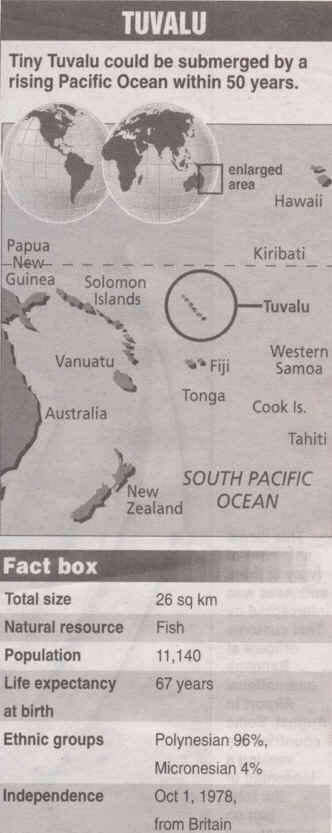|
"Do
they not then see that We are visiting the land,
curtailing
it of its sides? Shall they then prevail?"
(Qur'an 21:44)
|
|
THE STAR
Tuesday October 22, 2002
Section 2 /
5
Singking
Feeling
By RICHARD C. PADDOCK
(Note: A few paragraphs are left out here, and we
apologise - Pengurus Laman)
The isolated country of Tuvalu is not much more than a few specks in
the middle of the Pacific Ocean, but it is at the centre of international
debate over climate change. As the highest point on the island is a mere
five metres above sea level, many islanders worry that rising sea levels
caused by global warming will wash away their country.
By all appearances, Tuvalu is a Polynesian paradise. With seven coral
atolls and two coral islands, the country is spread across 560km of the
South Pacific north of New Zealand. Palm trees grow along white sand
beaches that fringe the turquoise waters of lagoons.
It remains to be seen whether science will support Tuvalu's predictions
of impending doom, but no one doubts that the country faces a precarious
existence.
At the ripe age of 65 million years, its atolls are nearing the end of
their geologic lifespan. Not only do islanders face the danger of the sea
rising, they also face the inevitable problems of the land sinking.
Each atoll was formed when a volcanic island sank beneath
the sea, leaving a ring of coral islands around a lagoon.
An outer reef protects the land from the pounding of the
sea. The coral can grow upward and keep pace with a gradual increase in
sea level, but if the ocean rises too quickly, the natural barrier could
be lost.
|
|

|
"If the reef is destroyed, it's goodbye Tuvalu," said Wolfgang
Scherer, director of Australia's National Tidal Facility.
The atolls are especially vulnerable to tropical storms that can
blow in and change the landscape overnight. In 1997, a cyclone swept the
topsoil and every tree and bush off the islet of Tepuka Savilivili in Tuvalu's
main atoll, Funafuti.
Tuvalu had little contact with the outside world until Spanish
explorers arrived in 1781. In the 1800s, slave traders stole hundreds of
people from the islands to work the guano mines of Peru. Missionaries
converted the rest of the population to Christianity.
Today, many Tuvaluans have a literal faith in the Bible and
don't believe any harm will come from global warming.
Shopkeeper Lutelu Kofe, 46, is typical. He is more concerned
about harm to the community from rising alcohol levels than rising water
levels.
"I read the Bible and God said to Noah: No more floods," Kofe
said. "So I'm not worried. When I see the sea, it's the same as before."
While there is no question that the world's oceans have been
rising, no one can predict with certainty how fast they will rise in the
future.
Nine years ago, scientists from Australia's National Tidal
Facility installed high-tech gauges in Tuvalu and 10 other Pacific islands to
measure changes in sea level.
The Tuvalu gauge has detected an average increase of 1mm a year
- the same rate at which the oceans have been rising for the last century.
Because the average ocean level can fluctuate more than a foot from year to
year, researchers say they will need at least two more decades to determine
whether the water is rising faster than before.
"The critical question is whether sea level rise is going to
accelerate," said Scherer. "So far, there is no evidence of that happening in
Tuvalu or anywhere else around the globe."
As the Earth's average temperature has gone up over the last
century, glaciers in the Rocky Mountains, the Swiss Alps, the Himalayas and
the Andes have receded.
The great fear is that the huge ice sheets of Greenland and
Antarctica will melt, drastically increasing the volume of water in the oceans
and inundating low-lying coastal areas.
In February, the time of year when the tides typically are
highest, the water rose to within 2.5cm of flooding the home of teacher Easter
Molu. Now she is convinced that global warming will destroy the islands.
"We think maybe next year the water will be inside our house,"
said Molu. - LAT-WP
Keratan Akhbar
Terkini Artikel
Perpustakaan
Bacaan E-Mail
Hiasan
Kalimat
Pilihan
Penemuan
Soalan
Lazim Sudut
Pelajar English
Articles
 Tulis kepada
Pengurus Laman
Tulis kepada
Pengurus Laman
